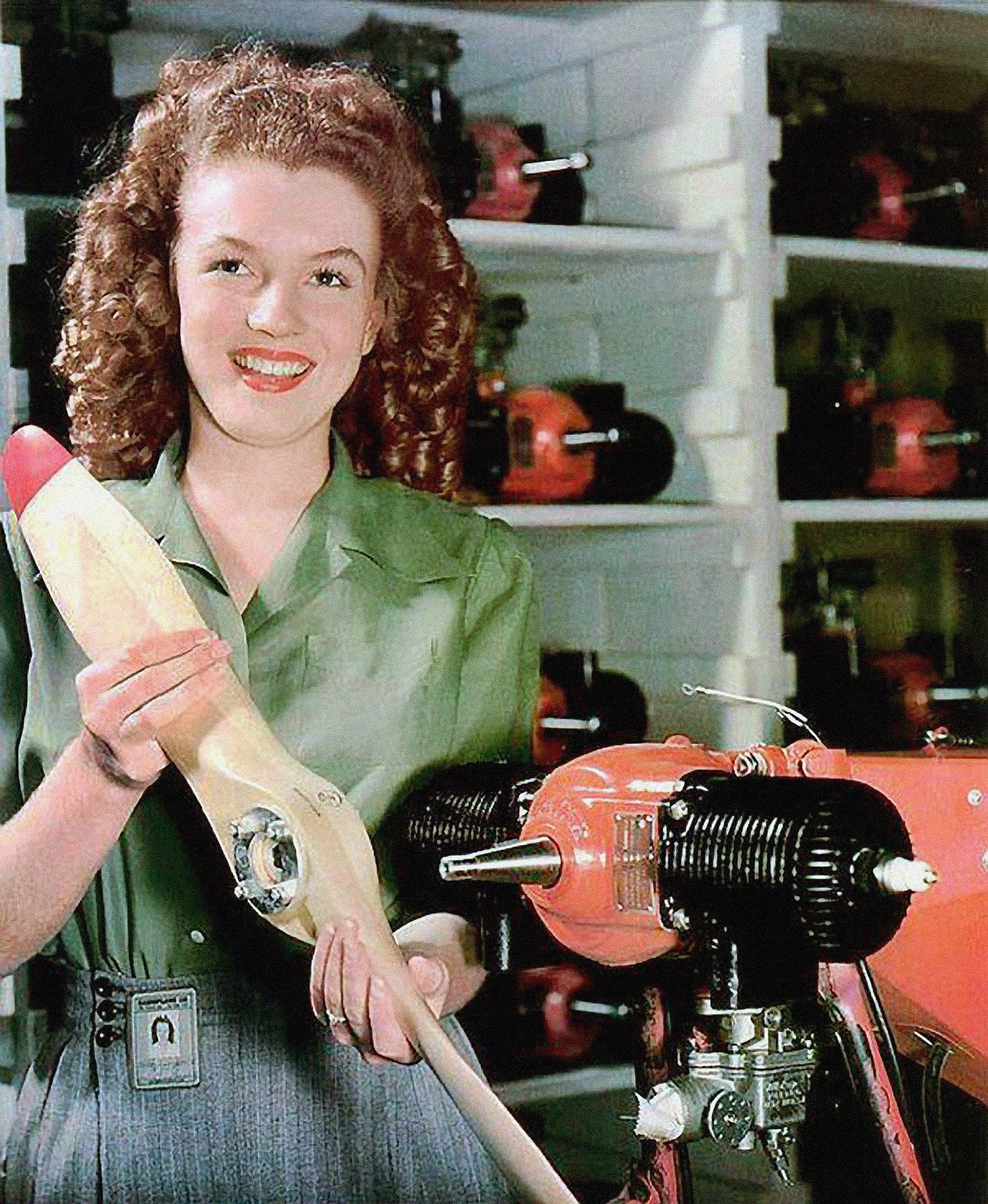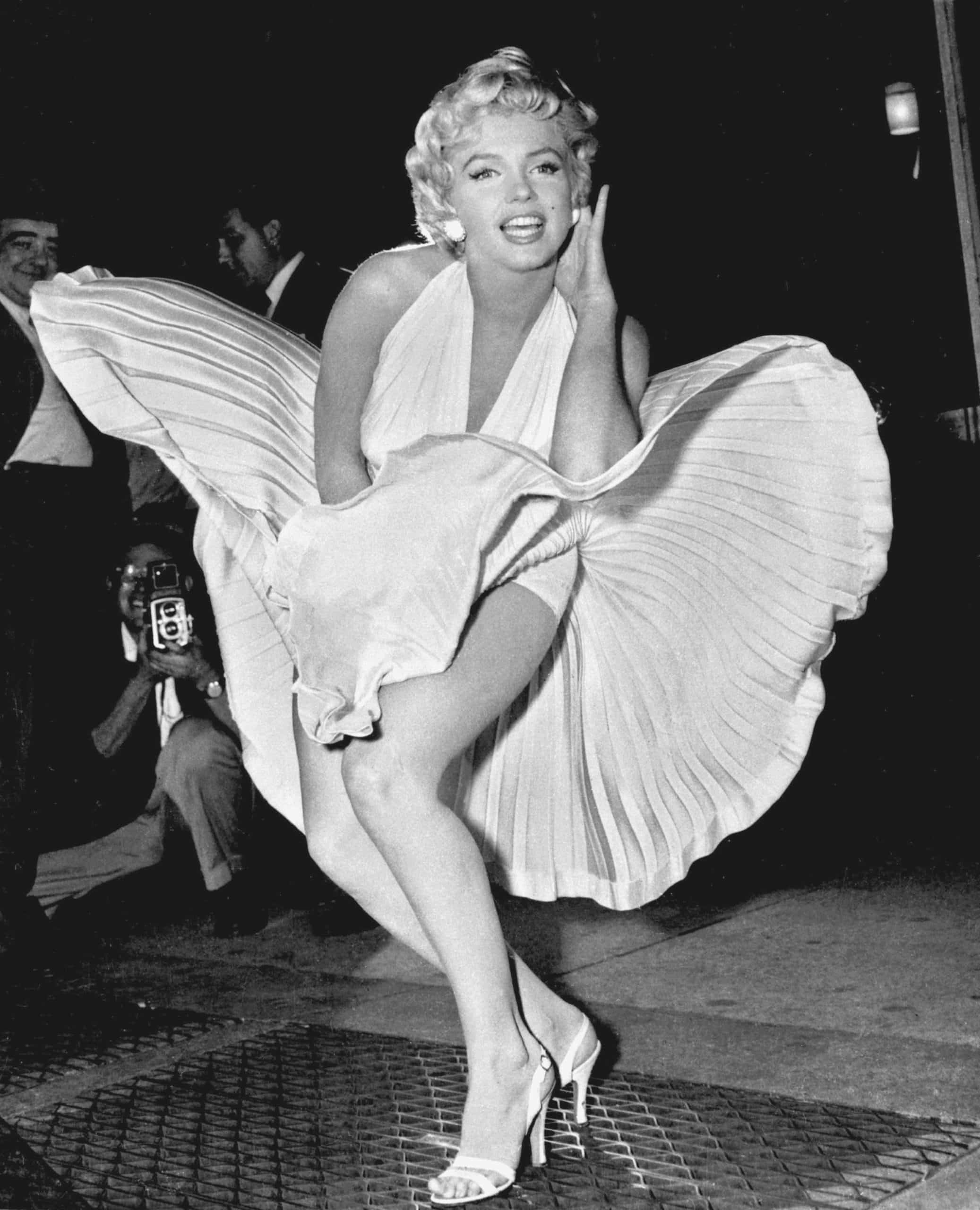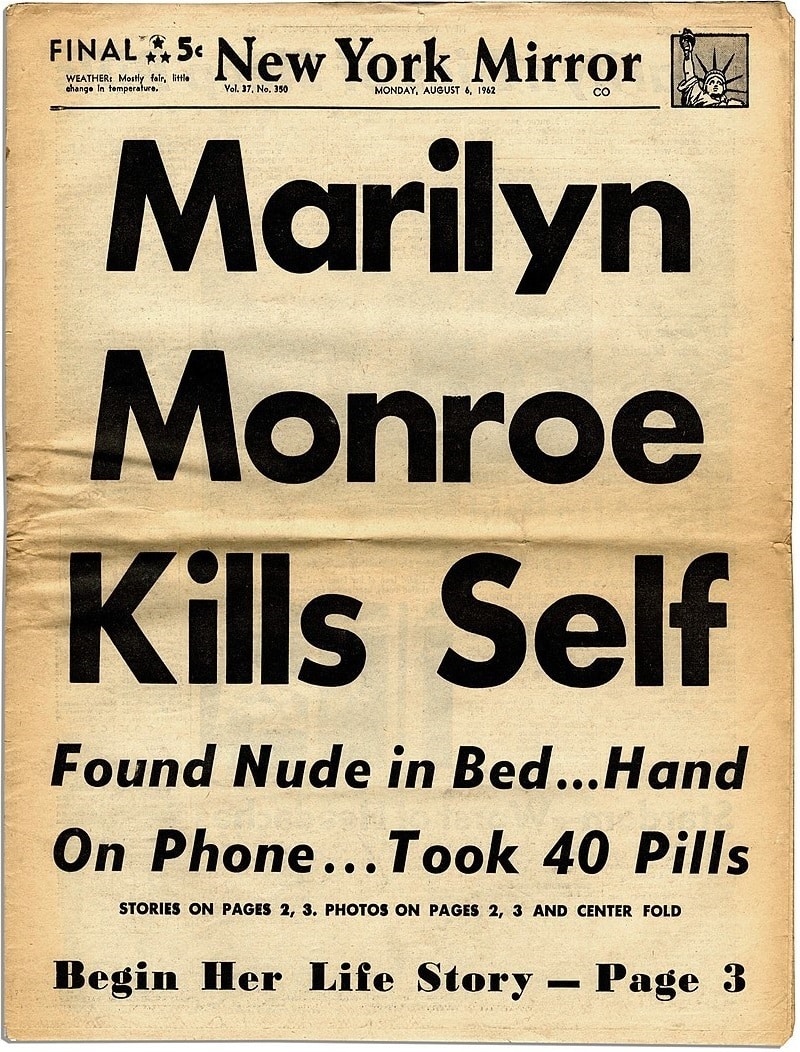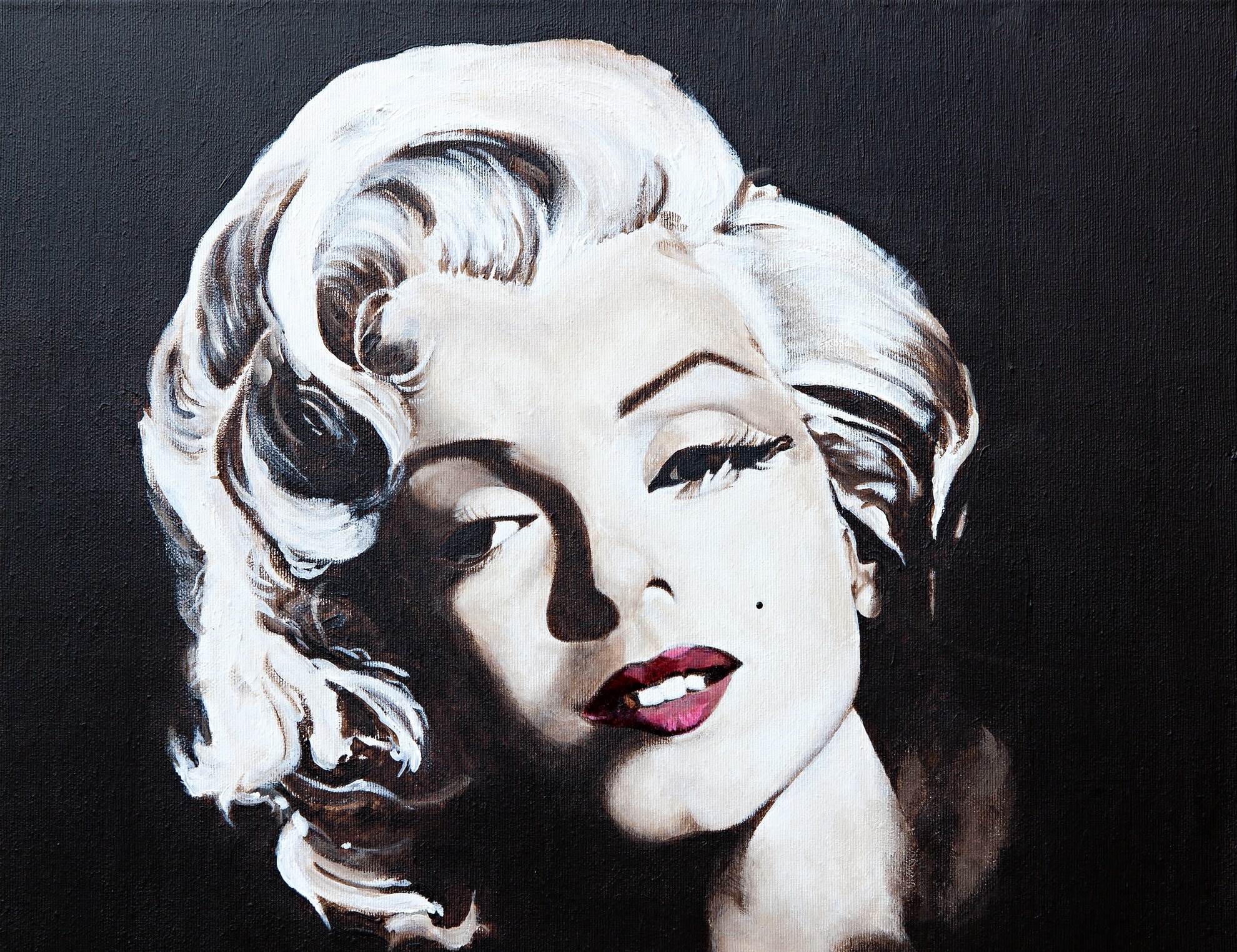This blog post is the biography of Marilyn Monroe. Marilyn Monroe was an actor, model, and singer based in the United States of America.
Marilyn Monroe became one of the world’s biggest sex symbols and an icon for female empowerment in the 1950s and 1960s. Even 58 years after her death, people still remember her for what she managed to achieve within a short period of time.
But Marilyn Monroe was not born rich. She wasn’t born to influential parents either. On the contrary, she was born to poor parents. In addition to that, she did not even get to spend much time with them because her mother became mentally ill when she was a child, and her father’s identity is still not 100% clear.
Understandably, Marilyn had a very difficult childhood. She was not only poor, but because of her mother’s health condition, she also lived with 12 sets of foster parents one after another and in an orphanage. As a result, she couldn’t get proper love and affection from her parents.
Some biographies motivate us to work harder, while others teach us to be humble by showing us how gifted we are. This biography of Marilyn Monroe is obviously the latter – this is the story of a little girl who suffered all her life. Read this biography of Marilyn Monroe now and get a glimpse into the saddening, yet motivational life story of that little girl.
Early Life
Gladys Monroe
Gladys Monroe was born to Otis Elmer Monroe and Della May Hogan in 1902. When she was seven years old, her father died due to an infection that destroyed his brain tissue. After her father’s death, hoping to find a husband, her mother had relationships with several men. But none of them lasted. Due to her mother’s inconsistent relationships and irresponsible behavior, young Gladys never really understood the importance of men and the role of women in a marriage. Moreover, since she lacked a father figure, she grew up craving attention from older men. So, when she was 14 years old, she claimed that she was 18 years old, and married a 26-year-old man called John Newton Baker.However, after giving birth to a son and daughter, the demands of motherhood tired her. Moreover, Gladys had no desire to be a conventional housewife. So, she would often leave her children in the care of her neighbors and go dancing and partying.As time progressed, Gladys wanted to be free, instead of being held down by the clutches of the family. So, in 1921, she filed for a divorce. Two years later, the divorce was granted, and her husband took their children with him.Gladys liked the new carefree life, which was devoid of a husband or kids. She often went on dates and had a good time with men.Several years later, when she was 22 years old, Gladys was attracted to a 27-year-old man called Martin Edward Mortensen. He had a stable job, was generous, handsome, and looked five years older than his current age. So, she married him. However, being a traditional housewife was something that was too boring for Gladys. Therefore, just four months after their marriage, she left her husband.
Birth of Norma Jeane
Almost ten months after Gladys left Mortensen, she found out that she was pregnant. As a result of the pregnancy, she gave birth to a baby girl on June 1st, 1926, in Los Angeles. However, since Gladys had been with several men after leaving Mortensen, she herself was not sure who the father was. The child’s father was most probably a womanizer called Charles Stanley Gifford. Charles Stanley Gifford was a coworker with whom Gladys had a brief affair. However, he abandoned her after finding out that she had gotten pregnant. Since she did not know who the father was, and also because she was still not divorced from Mortenson, she named the child as Norma Jeane Mortensen. The child was also called Norma Jeane Baker, taking the last name of Gladys’ first husband. This child would grow up and later revolutionize Hollywood by the name of Marilyn Monroe.
The first foster family
Gladys had no one who could help her financially. So, she couldn’t quit her job. Moreover, she knew that she couldn’t be a good mother due to her lifestyle. She was also scared of the responsibility of caring for a child. Therefore, when Norma was just two weeks old, Gladys left her in the care of a foster family living only sixteen miles away. She paid the family $25 every week to take care of Norma. Even though several children were fostered by the family, Norma lived there for the longest time. She lived there for the first six years of her life. During this time, the foster family took care of Norma properly. They even let her keep a puppy, which she brought home, as long as she took care of it.

Childhood photo of Norma Jeane, 1927 – By Dell Publications, Inc. New York, publisher of Modern Screen (Page 34) [Public domain], via Wikimedia Commons – File:Monroe as an infant.png, CC0, Link
Moreover, Gladys visited Norma on weekends and took her for picnics and outings. They would ride trams, tour glass factories, go to the beach, and eat ice cream. Yet, Norma was disturbed emotionally, because Gladys’ visits got less frequent, and Norma did not know when Gladys might stop visiting her.
A child’s confusion
As a child, Norma was always confused. The reason for the confusion is not hard to imagine. She saw other children addressing their parents as mother and father. So, she didn’t understand why her foster parents forced her to call them uncle and aunt. She did not understand that Gladys was her real mother, and her foster parents were just taking care of her. To her, Gladys was a fun lady who visited her often and took her to outings. When Norma turned seven, an angry neighbor shot and killed her dog because it was barking loudly. This caused a lot of pain to the little girl. So, unable to console the little girl, the foster family summoned her mother, Gladys.
Life with her mother
Gladys helped her bury the dog and took Norma to live with her. To Norma, living with Gladys was a new experience. Her foster parents were religious and highly disciplined. They did not approve of Norma watching movies.
On the other hand, Gladys worked in the film industry in Los Angeles to create the final version of the edited film. She often took Norma to watch movies. Norma would sit in the first row and watch the movies on the big screen with awe. Gladys often drank and danced with her friends on weekends. After Gladys was done drinking and dancing, little Norma often emptied the beer bottles that her mother drank and filled them with flowers from the garden. Even though Gladys was not a great role model, she tried her best to take care of Norma. As Norma was slowly getting adapted to living with her mother, everything changed suddenly.
Her Mother becomes mentally ill
All her life, Gladys had thought that her mother and father had died because of madness. In the year 1934, due to the economic depression and other reasons, her grandfather took his own life. Even though she did not know her grandfather personally, this made Gladys believe that mental illness runs in her family. So, she was convinced that she will become a lunatic as well. This pushed her into depression.
Due to the depression and the false belief, she started hallucinating. Often, she had difficulty in distinguishing between what is real and what isn’t. As a result, in the year 1934, Gladys was diagnosed with Paranoid Schizophrenia. She spent the rest of her life in and out of care homes and hospitals.
Grace Mckee
Since Gladys was deemed incapable of caring for her daughter anymore, Norma was sent to live with different sets of people for short durations and even in some orphanages. But primarily, she spent her years with the family of Grace Mckee and their relatives.
Grace Mckee was the most important friend and confidante of Gladys. She decided to take care of Norma after Gladys became ill. Grace didn’t have any children of her own and considered Norma as her daughter. So, even if Norma was living with some other foster family, she visited Norma often.
Grace thought Norma was really beautiful and would become an actress one day. So, she taught Norma to dress properly and take care of herself, so that she appears gorgeous all the time. Grace would later become a big influence in the life of Norma.
Thus, growing up, Norma could never get the parental love that she needed. At first, she thought her foster mother was her biological mother. Then, she adapted to live with her biological mother. After her mother fell ill, she had to move from one foster family to the next and was also sexually abused. All these incidents left a permanent scar on her mental well-being. As a result, she developed a stutter and became shy because of the trauma.
Norma Jeane becomes Marilyn Monroe
The first marriage
When Norma was 16 years old, the family of Grace, with whom she was living at that time, decided to move to West Virginia. But they couldn’t afford to take Norma with them. Even though Grace had promised Norma that she wouldn’t have to feel insecure again, she went back on her word. This devastated Norma because she felt like a dispensable object once again.
Since Grace’s family was moving to West Virginia, she wanted someone else to take care of Norma. So, Grace decided to get Norma married to her neighbor’s son, whom she was dating at that time. Since the only alternative was to stay in an orphanage until the age of 18, Norma agreed to the marriage. So, in 1942, the 16-year-old Norma Jean Mortensen quit school and married the 21-year-old James Dougherty. After their marriage, they moved to Santa Catalina Island, where her husband was stationed during the second world war. Marilyn later described this marriage as mundane. After a year of living with her husband, Norma came to live with her mother-in-law when her husband was posted to the Pacific.
Beginning of her modeling career
Norma’s mother-in-law was working in a Radioplane company as a nurse. At that time, the defense sectors were booming due to the second world war. So, Norma’s mother-in-law could easily get a job for Norma in the same company. Norma’s task was to spray varnish on the fuselage fabric.
In 1944, photographers came to shoot pictures of the most beautiful female factory workers for commercials and military magazines. Their task was to portray to the nation that America’s loveliest ladies showed their patriotism by working in defense companies.
One of these photographers, named David Conover, who had powerful contacts, was impressed by Norma. He advised her that she would have a great future if she got into modeling. Heeding to his advice, Norma quit her job the following year. She began doing modeling shoots for him and his other photographer friends. Gradually, she started applying to modeling agencies as well. One of these agencies, called the Blue Book Modeling Agency, accepted her. She signed her first contract with them in 1945.

Norma Jeane while working in the Radioplane company – By U.S. Army photographer David Conover’s shot – Yank, the Army Weekly, via [1] and [2], Public Domain, Link
The first divorce
Within a year, Monroe had appeared in more than 30 magazine covers and was called one of the most hard-working models by the owner of her agency. Her figure was more suitable for print advertisements than modeling. So, she began focusing on these magazines.
However, her husband was not pleased with this development in her career. He wanted her to quit modeling and become a housewife. So, Norma divorced him in the year 1946.
The birth of Marilyn Monroe
The same year, she met Ben Lyon, who was working with Fox production company. They signed a contract for six months with her even though she didn’t impress the head executive of the company. But Lyon didn’t want an actress who was called Norma Jean Dougherty. It seemed plain and unattractive.
So, Norma chose to have the last name, Monroe, since it was the name of her mother’s family. But Norma Jean Monroe was still not attractive. So, Lyon, remembering an actress called Marilyn Miller, with whom he had fallen in love previously, suggested that she should take the name of Marilyn Monroe. And just like that, the famous Marilyn Monroe was born.
The Rise to Fame
Entry into films
For the first six months after signing her contract, Marilyn did not do any films but worked on her acting and dancing skills. She got into an acting school with the help of the studio she worked with and met many people to promote herself. She got her first small role in the film “Dangerous Years” in 1947. Her contract was not renewed in 1947 after the teachers at the acting school said she was “too shy” to be a successful actor.
Marilyn continued her modeling journey. She started working as a backup dancer while continuing to take acting lessons. She did everything she had to do so that she could get acting roles. This involved befriending influential people in the industry and entertaining them at her home.
One such friendship with a Fox executive helped her get a contract with Columbia Pictures in 1948. But she lost that contract a year later as her picture didn’t work that well. She again went back to modeling and started some semi-naked shots, too, as she was comfortable with nudity.
Her big break came in the year 1950 when she earned a 7-year contract with 20th Century Fox studios after a series of small acting parts in movies like The Fireball, Right Cross, All About Eve, and The Asphalt Jungle. She got great reviews for The Asphalt Jungle, and even critics praised her. Her mentor and partner, Johnny Hyde, who got her these parts and the contracts, died of a heart attack days after she signed the contract. This left her shattered.
“Fear is Stupid. So are regrets” – Marilyn Monroe
A scandal
In 1949, Monroe posed for a series of nude photographs. These photographs surfaced in the year 1952 and threatened to put a dent on her career. Her production studio did not want them to affect her reputation. So, they thought it would be better if Monroe admitted to being the model in the photographs and told that she was broke when she did that photoshoot for some instant money.
Monroe gained a lot of public sympathy from this scandal. At the same time, she also became popular for her “Sex symbol” image rather than her acting skills. Her following films did do well. But all these films had her typecasted in blonde bombshell roles that demanded semi-nudity and suggestive clothes.
Monroe enjoyed this popularity and added fuel to it by turning up in revealing clothes on public forums and sharing sexy amusing facts about her to public columnists. In December 1953, Hugh Hefner published one of her nude photos as the center spread of the first copy of Playboy. This added to her already soaring popularity as the leading sex symbol of Hollywood.
“The body is meant to be seen, not all covered up” – Marilyn Monroe
Stardom and an abusive marriage
After a series of highly successful films as a blonde sex symbol, Monroe wanted to do some serious roles. But 20th Century Fox studios did not agree to it, as they thought that her serious films would not do well.
After many discussions, Monroe refused to shoot for another such movie. So, they suspended her and canceled her contract.
Marilyn wanted to stop this negative publicity from ruining her career. So, she married baseball star Joe DiMaggio and started traveling the world with him. She reunited with Fox Studios a few months later and was promised a lead role in what would go on to become one of the biggest movies of her career, “The Seven Year Itch.” She started filming for the film in 1954. It was released in 1955. It features the immensely popular subway grate scene in which Monroe can be seen standing on the subway grate with the skirt flying up. This scene would later become so famous that it would be featured in many magazines and films even decades after her death. Ironically, her on-screen success ended her marriage with Joe. Marilyn later claimed that Joe was physically abusive and had a controlling behavior. She filed for divorce but continued her relationship with Joe along with affairs with Arthur Miller and Marlon Brando during this period.

Marlin Monroe in the subway grate scene – Published by Corpus Christi Caller-Times-photo from Associated Press Corpus Christi Caller-Times page 20 via en:Newspapers.com Public Domain, Link
Founding her own production studio
After her contract with Fox Studios ended, Marilyn, along with photographer Milton Greene, founded Marilyn Monroe Productions. She began studying acting and using psychoanalysis to address her personal traumas. Her production studio could not produce films on its own. So, Monroe reunited with Fox Studios yet again after an intense legal battle. She signed a 7-year contract with them with four big films. In 1956, Marilyn married Arthur Miller despite the FBI pursuing a case against him. She began shooting for “Bus Stop” under Fox Studios, which went on to become a commercial success. Monroe received a Golden Globe award for best actress for her role in the film and was finally recognized as an actress instead of just a sex symbol. She completed one more film under her own banner after this. Then, she took an 18-months hiatus from shooting to concentrate on her family life. She suffered a miscarriage and an ectopic pregnancy in the period. So, she started taking pharmaceutical drugs to overcome her emotional depression. She and Miller finally got divorced in the year 1961. After this, Monroe resumed shooting on and off for films. But she did not get a commercial hit despite posing nude for a publicity stunt for the movie “Something’s Got To Give.” She was also involved in many legal battles with Fox Studios over delay in shooting. This gave her negative publicity in the final months of her life.
Final years
Depression and anxiety
In the last years of her life, Marilyn Monroe was battling depression caused by three failed marriages, miscarriages, a lost job, and the belief that mental illness runs in her family. She also suffered from anxiety and low self-esteem caused due to the lack of parental love when she was a child. The search for her father also devastated her terribly.
While she was living with her mother, the 8-year-old Marilyn found a picture of Charles Stanley Gifford, the man who was most probably her father. In her later years, she would try to reach him without any success. She would spend a lifetime trying to find this man in others, which affected her relationship with men. Once, when she called him in 1952, he told her that he didn’t have anything to say to her and that she should call his lawyer instead. This completely apathetic reply from the man she believed to be her father crushed her emotionally. All her life, she never stopped hoping for his approval.
Death

Magazine displaying the death news of Marilyn Monroe – By New York Daily Mirror – source (after en-wiki), Public Domain, Link
Marilyn Monroe died on the night of August 5th, 1962, when she was just 36 years old. Monroe’s housekeeper and her psychiatrist found her dead in her room due to drug overdose.
In the following years, her fans introduced many conspiracy theories and murder intentions, but police ruled them all out. Her sudden death became a national sensation. It was later revealed that Marilyn had overdosed on barbiturates, a drug used to treat anxiety, insomnia, and depression in the 1960s.
Facts you probably didn’t know
- Marilyn had a fear of losing her mind and going mad as her mother and grandmother did.
- She stuttered on occasions, and this stuttering continued for the rest of her life.
- Monroe attempted suicide in 1950 after her partner, agent, and close confidante Johnny Hyde died. She attempted suicide once again when she miscarried and had an ectopic pregnancy.
- According to her co-stars, Marilyn was extremely difficult to work with. She was even fired from her last film due to her lack of punctuality and erratic shooting schedule.
- Marilyn Monroe’s house, where she died in 1962, was purchased by a couple. The couple later found that the house was bugged, and an elaborate government phone tapping system was found across the house.
The Biography of Marilyn Monroe – Summary
We hope that this biography of Marilyn Monroe helped you learn about the actor and how she became a world-renowned personality. Whenever you have trouble making a decision, read this biography of Marilyn Monroe. If she hadn’t made the decision to divorce her first husband and pursue modeling, she could have raised a family and led a happy life. On the other hand, she wouldn’t have become a world-famous star. So, make the right decisions, for these decisions will define who you are.
It’s all make believe, isn’t it? – Marilyn Monroe
If you liked the biography of Marilyn Monroe, you might like the following biographies as well:
- Interesting facts about Marie Curie
- The success story of Oprah Winfrey
- The biography of Helen Keller


Leave a Reply